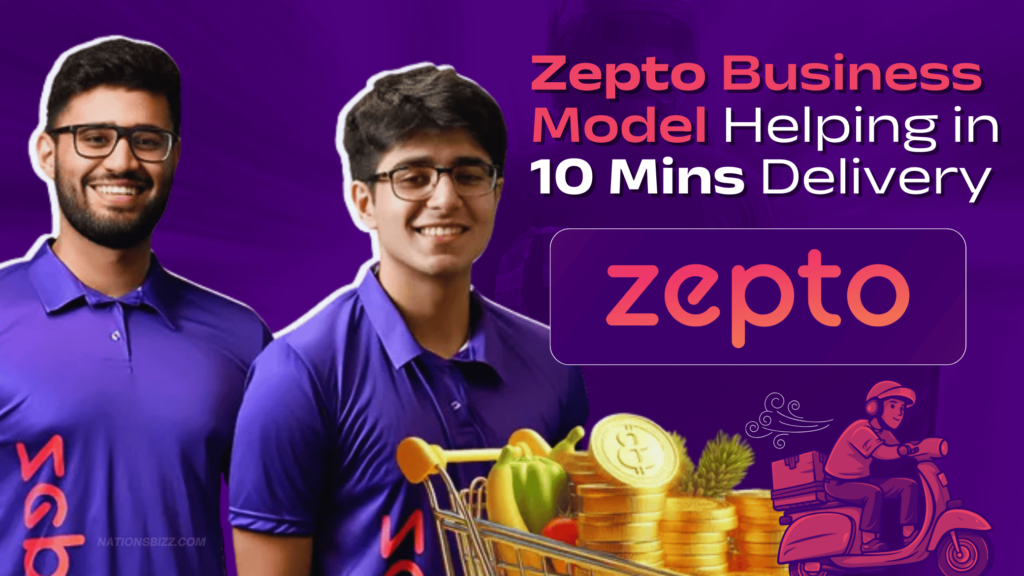In recent years, the landscape of online grocery delivery has witnessed significant transformations with the emergence of ultra fast delivery services. Among the most prominent players in this sector is Zepto, a company that promises delivery within ten minutes. Founded in 2021 by Aadit Palicha and Kaivalya Vohra, Zepto has captured the imagination of consumers and investors alike. This article explores Zepto business model, growth, challenges, and broader effect on the quick commerce industry.
The Zepto Business Model
Zepto core proposition is speed. Unlike traditional e-commerce platforms that promise same day or next day delivery, Zepto aims to deliver groceries and essential goods within ten minutes. This rapid service is made possible through a network of strategically located micro-warehouses, commonly referred to as dark stores.
Dark stores are small warehouses located in densely populated urban areas. They are stocked with high-demand grocery items and consumer goods. Zepto technology driven inventory management system ensures these warehouses are always well-stocked. When a customer orders, the nearest dark store processes it, and a delivery partner is dispatched immediately to ensure swift full fillment. This focus on hyper-localization and efficient stock management has been central to Zepto promise of ultra-fast service. Moreover, Zepto leverages data and artificial intelligence to optimize order processing. Predictive algorithm help manage inventory turnover rates, while dynamic routing systems assist delivery partners in reducing transit time. These technological advancements create a scalable and sustainable model for rapid full fillment.
Growth and Market Penetration
Zepto rapid growth has been nothing short of remarkable. Within a year of its launch, the company secured significant funding from top venture capital firms. This backing allowed Zepto to expand its operations across major metropolitan areas in India, including Mumbai, Bengaluru, Delhi, and Chennai. Strategic partnerships with local suppliers and logistic providers further bolstered its reach.
One of Zepto key strategies for market penetration has been its focus on building a different logistic network. By optimizing delivery routes and leveraging advanced algorithm, Zepto minimizes delivery times and operational costs. Furthermore, its intuitive phone app provides a seamless user experience, making it easy for customers to browse products, place orders, and track deliveries. A well designed user interface and efficient customer service contribute to high user retention rates and word-of-mouth promotion.
Consumer Response and Adoption
The convenience offered by Zepto has been a major driver of its popularity. Busy urban consumers appreciate the ability to receive essential items in minutes without leaving their homes. This demand for instant gratification has particularly resonated with younger demographics and working professionals. Time sensitive needs, such as preparing a meal or replenishing household supplies, make Zepto a go to option for many.
However, Zepto success also hinges on its ability to maintain reliability. Consistency in delivery times and product availability is critical to retaining customers. To achieve this, Zepto invests heavily in technology infrastructure and workforce training to ensure smooth operations. Real time tracking, automated restocking alerts, and dedicated customer feedback loops are integral to its continuous improvement process.
Competition in the Quick Commerce Sector
Zepto operates in a highly competitive market. Major players like Swiggy Instamart, Blinkit (formerly Grofers), and Dunzo are also vying for dominance in the quick commerce segment. Each of these companies brings unique strengths, whether it be an extensive network, deep pockets for marketing, or diverse service offerings.
To differentiate itself, Zepto emphasizes its core strength, speed. The company continuously refines its processes and invests in technology to stay ahead. Additionally, Zepto lean inventory model and hyper local dark store strategy provide a cost effective approach to scaling operations. Its focus on operational efficiency helps mitigate the higher costs associated with rapid deliveries.
Zepto also capitalizes on consumer trends by offering curated product selections and personalized recommendations. This strategy not only enhances the shopping experience but also fosters customer loyalty in a competitive landscape.
Challenges and Sustain ability Concerns
While Zepto business model has been unique, it also faces several challenges. Profitability remains a critical issue. The cost of maintaining dark stores, paying delivery partners, and managing logs can be substantial. The company must balance the pressure to keep prices competitive while ensuring long-term financial sustain ability.
Labour dynamics pose another challenge. Delivery personnel are the backbone of Zepto operations, and the pressure to full fill orders within a ten minute window can lead to stress and safety risks. Ensuring fair wages, reasonable working conditions and safety measures are essential for sustainable growth. Zepto investment in employee welfare programs and delivery infrastructure enhancements will be key to addressing these issues.
Additionally, critics have raised environmental concerns regarding the carbon footprint associated with ultra-fast delivery models. The frequent and small scale deliveries result in higher emissions compared to traditional bulk deliveries. Addressing these concerns will require unique solutions such as electric vehicle fleets and optimized delivery routes. Investing in sustainable packaging and carbon offset initiatives could further align the company with eco-friendly business practices.
The Future of Quick Commerce
Despite these challenges, the quick commerce sector shows immense growth potential. Changing consumer behaviour, increased urbanization, and technological advancements are driving demand for faster delivery services. Zepto is well positioned to capitalize on these trends, provided it navigates its challenges effectively.
To ensure future success, Zepto could explore additional revenue streams, such as premium memberships or partnerships with local businesses. Investing in green logistic and sustainable practices will also be crucial as consumers become more environmentally conscious. Moreover, diversifying its product range to include niche categories like fresh produce, gourmet foods, and health products could enhance its market share.
Strategic Insights for the Future
Zepto Business Model rapid rise highlights the growing importance of speed and convenience in modern retail. By redefining grocery delivery with its ten-minute promise, Zepto has set a new benchmark in the industry. However, sustaining this growth will require strategic creation, a focus on profitability, and a commitment to social and environmental responsibility. By continuously evolving its technology, optimizing operational efficiency, and adopting sustainable business practices, Zepto can maintain its competitive edge. The quick commerce revolution is just beginning, and Zepto is poised to play a significant role in shaping its future.

















